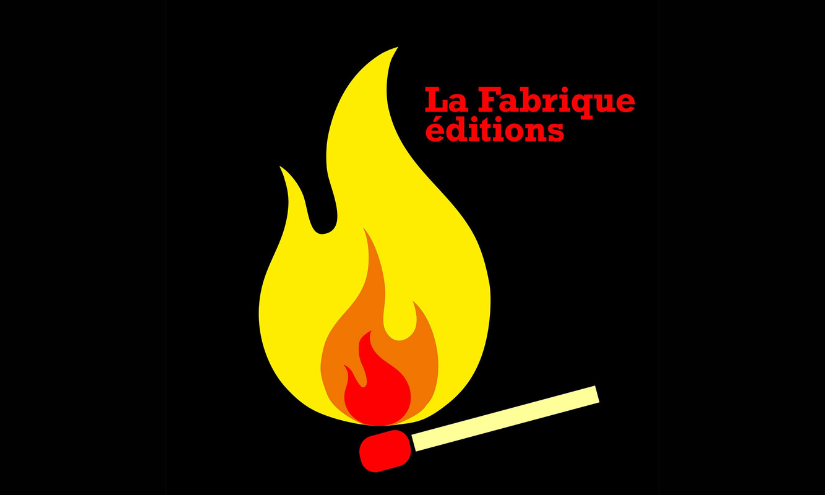Statement by La Fabrique authors
In honour of World Press Freedom Day, we are publishing this statement from La Fabrique's authors in solidarity with La Fabrique's rights manager, Ernest, who was outrageously arrested by UK anti-terrorism police upon his arrival in London from Paris on 17 April.

**This statement was originally published in Le Monde.
Historians, philosophers, activists, writers, psychologists, lawyers, teachers, academics, economists, journalists -- we all have in common that we have published with La Fabrique. We are attached to this publishing house, founded 25 years ago by Eric Hazan, whose catalogue is both rich and intellectually serious.
We were dismayed to learn of the arrest of its foreign rights manager, Ernest, in London on 17 April last, when he was on his way to the London Book Fair, a major literary event in Europe, to promote the company’s rights list. The fair is not just a commercial event. The presence of publishers like La Fabrique is an essential counterweight to the overexposure of industrial publishing on an international scale, and to the linguistic hegemony of the major countries of the global North.
Ernest was arrested as he left his train at St Pancras station in London under anti-terrorism legislation – Schedule 7 of the Terrorism Act 2000. This provision, which has been denounced in Britain by human rights groups, allows individuals to be stopped, questioned, searched, and, if necessary, detained without any prior authorisation or suspicion. It also allows electronic devices to be seized and data retrieved without any justification. Ernest had his phone and work computer confiscated. During his interrogation, he was questioned about ‘anti-government authors at La Fabrique’. He was asked to provide access codes to his devices, which he refused to do. On the basis of this refusal, he was charged with obstructing an anti-terrorist investigation.
We need to take a step back and consider the danger that such a procedure represents for us, authors linked to this publisher, and for democratic freedoms in general. We have here a particularly liberticidal legislation (one of the toughest in Europe) that permits an anti-terrorist investigation to be launched without suspicion. It allows the authorities to download all someone’s data without any evidence or serious leads, on the assumption that they might find something suspicious in it. Since the questions posed to Ernest concern French politics and the positions of La Fabrique authors, we have to imagine that the French services chose a favourable opportunity to obtain the data of a potentially embarrassing publisher without any judicial motive.
Do we really appreciate what this means for us and the debate of ideas? In order to produce a book, it is necessary to have preliminary notes and drafts, to gather sensitive sources, to transcribe interviews with people who wish to remain anonymous, and sometimes to write under a pseudonym. These indispensable stages require a form of confidentiality, either to give an idea the time and work necessary for it to unfold, or because the preparatory elements are not intended to be disclosed.
It goes without saying that freedom of expression really deserves the name only when it applies to people or groups that do not please the authorities or big business; when it aims to protect works that might anger a government or large corporations; when it presupposes a right to secrecy before texts are disseminated; and when it is also based on the free circulation of ideas throughout the world.
Arresting the representative of a publishing house without cause, or having them arrested abroad, and threatening them with heavy proceedings if they do not cooperate in the theft of their own data is a form of pressure that is unacceptable in a society that claims to be democratic. The context of Ernest’s arrest and the nature of Schedule 7 of the Terrorism Act should alarm us: such methods can be used against any publisher, editor, author or journalist. This is a new threshold of authoritarianism that has been crossed, and one that is extremely worrying because it places censorship not just on published books but on the very idea or project of writing one. It is a further threat to whistleblowers.
We demand that the charges against Ernest be dropped and that his material be returned. We demand the truth from the French government about this case and in particular about its involvement and intentions. We urgently need to defeat the Macron presidency, which seems determined to bury all our freedoms one after the other.
Signatures: Tariq Ali, Zahra Ali, Grey Anderson, Bernard Aspe, Eric Aunoble, Jean Christophe Bailly, Marc Belissa, Mathieu Bellahsen, Omar Benderra, Lise Benoist, Jacques Bidet, Bertrand Binoche, Ian H. Birchall, Félix Boggio Éwanjé-Épée Thomas Bouchet, Houria Bouteldja, Yannick Bosc, Olivier Brisson, Christian Bruel, Judith Butler, Pilar Calveiro, Laurent Cauwet, Grégoire Chamayou, Nicolas Da Silva, Mathieu Dejean, Alain Deneault, David Dufresne, Eric Fassin, Joëlle Fontaine, Bernard Friot, Françoise Fromonot, Florent Gabarron-Garcia, Isabelle Garo, François Gèze, Pierre-Yves Glasser, Jean-Marie Gleize, Christophe Granger, Raphaël Kempf, Razmig Keucheyan, Sadri Khiari, Armelle Laborie-Sivan, Sylvain Lazarus, Jean-Jacques Lecercle, Mathieu Léonard, Laurent Lévy, Wendy K. Lochner, Frédéric Lordon, Pierre Macherey, Stella Magliani-Belkacem, Andreas Malm, Natacha Michel, Elaine Mokhtefi, Jean-Yves Mollier, Marie-José Mondzain, Alain Naze, Olivier Neveux, Anne Quennedey, Nathalie Quintane, Jacques Rancière, Mathieu Rigouste, Paul Rocher, Kristin Ross, Alain Rustenholtz, Malise Ruthven, Julien Salingue, Thierry Schaffauser, Claude Serfati, Eyal Sivan, Patricia Sorel, Jean Stern, Marcello Tarì, Alberto Toscano, Enzo Traverso, Françoise Vergès, Arnaud Viviant, Louisa Yousfi.